|
De Britse dichter en schrijver Dannie Abse werd geboren op 22 september 1923 in Cardiff, Wales. Zie ook mijn blog van 22 september 2010 en eveneens alle tags voor Dannie Abse op dit blog.
In the Theatre
Sister saying—‘Soon you'll be back in the ward,'
sister thinking—‘Only two more on the list,'
the patient saying—‘Thank you, I feel fine';
small voices, small lies, nothing untoward,
though, soon, he would blink again and again
because of the fingers of Lambert Rogers,
rash as a blind man's, inside his soft brain.
If items of horror can make a man laugh
then laugh at this: one hour later, the growth
still undiscovered, ticking its own wild time;
more brain mashed because of the probe's braille path;
Lambert Rogers desperate, fingering still;
his dresser thinking, ‘Christ! Two more on the list,
a cisternal puncture and a neural cyst.'
Then, suddenly, the cracked record in the brain,
a ventriloquist voice that cried, ‘You sod,
leave my soul alone, leave my soul alone,'—
the patient's dummy lips moving to that refrain,
the patient's eyes too wide. And, shocked,
Lambert Rogers drawing out the probe
with nurses, students, sister, petrified.
‘Leave my soul alone, leave my soul alone,'
that voice so arctic and that cry so odd
had nowhere else to go—till the antique
gramophone wound down and the words began
to blur and slow, ‘ … leave … my … soul … alone … '
to cease at last when something other died.
And silence matched the silence under snow.
Angels
Most are innocent, shy, will not undress.
They own neither genitals nor pubic hair.
Only the fallen of the hierarchy
make an appearance these secular days.
No longer useful as artists' models,
dismissed by theologians, morale tends
to be low—even high class angels grumble
as they loiter in our empty churches.
Neutered, they hide when a gothic door opens.
Sudden light blinds them, footsteps deafen,
Welsh hymns stampede their shadows entirely.
Still their stink lingers, cold stone and incense.
But the fallen dare even to Downing Street,
astonish, fly through walls for their next trick;
spotlit, enter the dreams of the important,
slowly open their gorgeous, Carnaby wings.
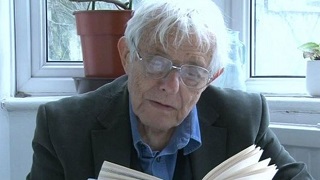
Dannie Abse (22 september 1923 – 28 september 2014)
De Nederlandse dichter, schrijver en criticus Lodewijk van Deyssel werd geboren op 22 september 1864 in Amsterdam. Zie ook mijn blog van 22 september 2010 en eveneens alle tags voor Lodewijk van Deyssel op dit blog.
Uit: Een begrafenis
“Een man met witten bef en zwarten steek op, en die ook met frisch rood doormarmerde wangen had, groette met den steek en opende mij zwijgend de glazen deur van het huis.
Ik ben binnengetreden en eerst gekomen door een vertrek, dat geheel verlaten was; toen ben ik trappetreden opgegaan en door een tweede glazen deur plotseling gekomen in de doodekamer.
Het was een kleine kamer, waar vele zware donkere gestalten, de hoofden aan-gebogen, zwijgend stonden en een enkele knielde; vóór hen was een open ruimte; aan de andere zijde daarvan lag, zeer verlicht door kaarsen op zilveren kandelaars, de doode recht ter neder. De wanden van dat, waar de doode plat in ter neder lag, waren wit aan de zijden, waarmede zij hem omgaven.
Hij was beeld-schoon, gekleed in wit rag-fijn, met smalle witte krullen bezoomd, rein overkleed.
Hij zag er uit gelijk toen hij een jongling was, in dien tijd toen hij het groote leven ging beginnen; maar als een jongeling, die rimpelloos schoon is in zijn slaap en heeft de kleuren van een grooten lentedageraad.
Hij geleek van reine was, bestemd tot offerande, en de opgestoken vingers zijner handen waren als onbewegelijke kaarsen, waarlangs veel was reeds scheen gevloeid en die met onzichtbare vlammen brandden.
Zijn twee kindren stonden daar. Zij hadden gladde, verweesde hoofden, blond van kleur. Zij schenen omgeven van verlatenheid en stonden met hun kleurige gezichten aan de zwarte muur der onbewegelijke schaar van vreemde mannen, terwijl hun vader zoo bizonder mooi als zij hem nooit hadden gezien en als een prachtig aangekleedde jonge kameraad daar bij hen nederlag.
Ik ben voorbijgegaan en door een donkerte in een ander weer dagelichter vertrek gekomen, waar het zeer naauw en klein was. Er waren verscheidene oude vrouwen, in zwarte kleederen gekleed en wier oogen binnen de vuurroode randen gevangen vogels leken achter gloeyend brandende vensterkozijnen. Een bijna blinde oude vrouw met laag afhangende mat ròze boven-oogleden schreed binnen, laag en log en lichtlijk heen en weder wanklend, en scheen door te willen gaan ofschoon het huis hier eindigde.
Een dorre jonge vrouw, met graauw gelaat, stond al-door aan de deur en schreide zeer.”
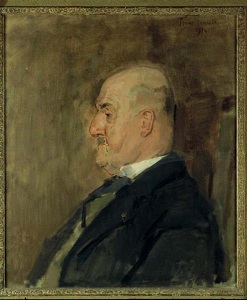
Lodewijk van Deyssel (22 september 1864 - 26 januari 1952)
Portret door Isaac Israëls, 1934
De Australische singer / songwriter, dichter, schrijver en acteur Nicholas Edward Cave werd geboren in Warracknabeal op 22 september 1957. Zie ook alle tags voor Nick Cave op dit blog.
Uit: The Death of Bunny Munro
“The sob doubles on itself, then doubles again, till it becomes gentle, wretched crying and it reminds Bunny of their first night together — Libby lying in his arms, in the throes of some inexplicable crying jag, in a down-at-heel hotel room in Eastbourne. He remembers her looking up at him and saying, `I'm sorry, I get a little emotional sometimes,' or something like that, and Bunny pushes the heel of his hand into his crotch and squeezes, releasing a pulse of pleasure into his lower spine. `Just take the fucking Tegretol,' he says, softening. `I'm scared, Bun. There's this guy running around attacking women.' `What guy?' `He paints his face red and wears plastic devil's horns.' `What?' `Up north. It's on the telly.' Bunny picks up the remote off the bedside table and with a series of parries and ripostes turns on the television set that sits on top of the mini-bar. With the mute button on, he moves through the channels till he finds some black-and-white CCTV footage taken at a shopping mall in Newcastle. A man, bare-chested and wearing tracksuit bottoms, weaves through a crowd of terrified shoppers. His mouth is open in a soundless scream. He appears to be wearing devil's horns and waves what looks like a big black stick. Bunny curses under his breath and in that moment all energy, sexual or otherwise, deserts him. He thrusts the remote at the TV and in a fizz of static it goes out and Bunny lets his head loll back. He focuses on a water stain on the ceiling shaped like a small bell or a woman's breast. Somewhere in the outer reaches of his consciousness he becomes aware of a manic twittering sound, a tinnitus of enraged protest, electronic sounding and horrible, but Bunny does not recognise this, rather he hears his wife say, 'Bunny? Are you there?' `Libby. Where are you?' `In bed. Bunny looks at his watch, trombones his hand, but cannot focus. Tor Christ's sake. Where is Bunny Junior?' `In his room, I guess. `Look, Libby, if my dad calls again . `He carries a trident,' says his wife. `What?' `A garden fork.' `What? Who?' `The guy, up north.' Bunny realises then that the screaming, cheeping sound is coming from outside.”
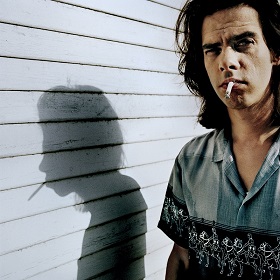
Nick Cave (Warracknabeal , 22 september 1957)
De Britse schrijfster Fay Weldon werd geboren op 22 september 1931 in Alvechurch, Engeland. Zie ook mijn blog van 22 september 2010 en eveneens alle tags voor Fay Weldon op dit blog.
Uit: Before the War
“Consider Vivien in the year 1922. She's waiting for the London train. It's a cold November morning, the station is windswept and rural, the sky is threatening snow, and the train is late. Vivien is single, large, ungainly, five foot eleven inches tall and twenty years old. She has no coat, just a tweed jacket and a long brown woollen scarf to keep her warm. She snatched the scarf from a peg just before she left home for the mile long walk to the station. The scarf is a dreary dusty old thing. Moths have been at it. It's been hanging on its peg by the back door amongst old coats, jackets, hats and caps for years. Not so long ago the scarf would have been noticed, laundered, darned, ironed, folded and put in its appropriate drawer within the hour. But time has passed and wars have happened and these days one just can't find the staff to pay attention to detail. I'm not asking you, reader, to step back in time. I'm asking you to stay happily where you are in the twenty-first century, looking back. Vivien has seared herself into my mind, this single stooping figure -she tends to stoop, being conscious that she is taller than most wom-en and quite a lot of men - as she waits alone for a train on a crucial day in her life in November 1922. So I offer Vivien and her fate to you, the reader. We like to dream the costume drama of Edwardian times, all fine clothes, glittering jewels and clean sexy profiles - but we are less drawn to the twenty years between the wars.
Understandably. Limbless ex-servicemen beg for alms on hard-heart-ed city streets while hysterical flappers, flat-chested, dance and drink champagne in Mayfair night-clubs. Shell shock, the Fifth Horseman of the Apocalypse - what we now call post-traumatic stress syn-drome - still stalks the land. Life expectancy for the poor is forty-five; for the rich, sixty-five. Vivien is young and rich but no flapper. She is too large and ungainly to look good dancing, and one would certainly never guess she was rich from the frumpy way she dresses. Had she had a more exuberant personality her height would have seemed no great drawback; she could have sparkled and charmed and flung out her chest to the ad-miration of men and women both, but Vivvie was not like this. She suffered and let it be seen that she suffered. She stooped.“
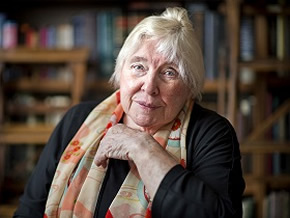
Fay Weldon (Alvechurch, 22 september 1931)
De Hongaarse dichter en schrijver György Faludy werd geboren op 22 september 1910 in Boedapest. Zie ook mijn blog van 22 september 2010 en eveneens alle tags voor György Faludy op dit blog.
Mandelstam by the Fence (Fragment)
Osip, you made me jump… Here I was squatting
near to the barbed-wire fence that runs along
the edge of this autumn woodland nearly bereft
of foliage, by the bed of a purple spring,
where I shed my role as a prisoner as soon as I
bent over the carpet of leaves beside my knees.
What wealth, what plentitude of colours and shades!
The melancholy brown of the horse-chestnut leaves
stretched out, their wrinkles straightened out, reshaped
by the smothering-iron of time, disintegrating
already in places but held together still
by networks of thread-like blood-vessels. Lying supine,
the leaves of oak trees still retained their spots
of green and red, reminders of bygone youth
and age, and here and there their surfaces blistering
like thickening porridge stirred on a cooking stove,
perhaps protesting the end of their sailing days
or mourning their flight with every passing breeze.
And then… two tiny leaves bent and conjoined
and shaped like flower petals or maybe a barge,
one ocher-yellow and the other pink;
they must have fallen prematurely – but
from where? that leafless bush, I guessed, five paces
away, the one hardly taller than a dove.
I gently picked the pink one by two fingers
but did not sense a substance held between them.
Vertaald doorThomas Ország-Land
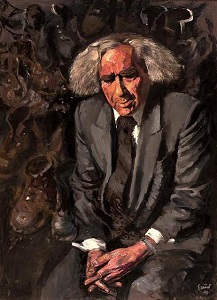
György Faludy (22 september 1910 – 1 september 2006)
Portret door Ezüst György, 1990
De Duitse dichter en schrijver Hans Leip werd geboren op 22 september 1893 in Hamburg. Zie ook alle tags voor Hans Leip op dit blog.
Uit: Die Nächtezettel der Sinsebal
„Dann tanze ich das Spiegellied. Das Spiegellied? Oho! Was weiß mein Bein von mir? Was weiß mein Nacken von mir? Was weiß die weiße Haut? Der Vorhang ist zu, der Teppich grau und ein einziger Kuß. Da schläft mein Bett allein. Nein, gaffen die Kissen? Und pumpen die Puppen im Stuhl in der Kuhle die Mäuler zum Wundern rund? Die Berge schmunzeln auf den Bildern. Was macht die Lampe denn? Die Lampe macht sich winzig, rennt in mein Knotenhaar, brennt in mein Bronzepudelhaar, ein Edelstein, mein süßer Karfunk!
Ei Fürstin, ei Engelbengel, hü! Ei Töchterlein, ei Schmatz, mein Schatz!
Nun neigen sich die Arme sehr, die Schultern schleichen hinterdrein. Nun schlüpft das Knie davon, nun ruft das andre zärtlich nach. Schnipp, macht der Finger.
Nun heben sich die Zehen, tirili. Nun scharwenzen die Hüften juja, nun klingeln ting, ting die Brüstelein.
Nun stülpt eine Glocke über mich. 0 schwanker Trunk, dunkles Blau! Wer schwingt mich so, o halt, nein! 0 ja, schön! Noch fängt mich der Spiegel, steif grapst mich sein Mantel, nun klemmt er nicht mehr, schmal bin ich ihm weg, fängt mich nicht, fängt mich nicht! Nun Kreisel, nun Mond im Griff. Wirft mich ein Gaukler? Ein Walfisch schnappt mich. Feuer ist, Feuer ist! 0 schauert mich Eis!
Nun kreiseln die Wiesen, viel Blumen wie Mücken, die Schwalben, die Rehe, o schwindelnder Duft; nun häng' ich im Wind, wie Zweige geschaukelt, wie Blätter geschleudert, wie Sternschnuppen blank. Nun schieß' ich hinauf, o dunkel, o sausend, nun schluckt mich die Sonne, nun ist sie mein Tanzrad, ist toll, ist toll, o Fieber, ich brenne! Zu Regenbögen gestriemt die Wände, die Puppen, die Stühle, mein Hemd, meine Kissen, mein Bett, meine Bücher, ich schwebe, ich falle!
Da schneidet der Spiegel die Welt auseinander, er fängt mich. Er torkelt.
Da steh' ich ja nackt.
Mein Karfunkel dahin, ach, umgemünzt zum braven Mundgulden, zu den Pfennigen Tipf und Tupf, zum Spängelein Ungelöst, Ungetröst zwischen den hängenden Händen.“
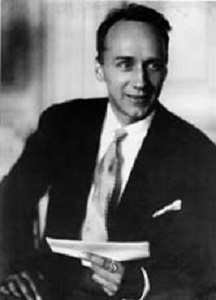
Hans Leip (22 september 1893 – 6 juni 1983)
De Israëlische Hebreeuwse en Jiddische dichter en politicus Uri Zvi Greenberg werd geboren op 22 september 1896 in Bialikamin, Lviv, in Galicië, destijds behorend tot Oostenrijk-Hongarije. Zie ook alle tags voor Uri Zvi Greenberg op dit blog.
Anxiety in my bones today
Anxiety in my bones today.
I come to you with the feeling of one again
Banished slowly and stealthily from sacred landscapes;
Unredeemed landscapes of the enfeebled
Although still in the hands of the Fire Riders,
sons of Joshua Ben Nun today;
And like the fickle, who do not know why they are that way,
So I, who differ from them in my view of the future
Cannot grasp without reason
Why and wherefore this verdict of "lost tomorrow" can be possible
With Jewish signature upon the paper:
Back to the bottleneck.
Homesong
She is silent, my martyred mother,
Her eyes rise against my face, not looking at me, but beyond.
I look behind her, behind my back, at the wall,
The hanging mirror is shrouded in a sheet
And below, a barrel of darkest water,
My father’s prayer shawl floating in it
Its silver neckpiece gone.
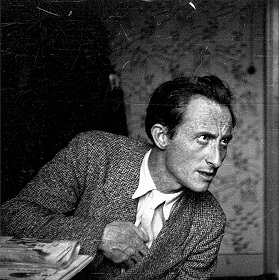
Uri Zvi Greenberg (22 september 1896 – 8 mei 1981)
De Britse schrijfster Rosamunde Pilcher werd op 22 september 1924 geboren in Lelant, Cornwall, Groot-Brittannië. Zie ook alle tags voor Rosamunde Pilcher op dit blog.
Uit: Coming Home
“The Porthkerris Council School stood half-way up the steep hill which climbed from the heart of the little town to the empty moors which lay beyond. It was a solid Victorian edifice, built of granite blocks, and had three entrances, marked Boys, Girls, and Infants, a legacy from the days when segregation of the sexes was mandatory. It was surrounded by a Tarmac playground and a tall wrought-iron fence, and presented a fairly forbidding face to the world. But on this late afternoon in December, it stood fairly ablaze with light, and from its open doors streamed a flood of excited children, laden with boot-bags, book-bags, balloons on strings, and small paper bags filled with sweets. They emerged in small groups, jostling and giggling and uttering shrieks of cheerful abuse at each other, before finally dispersing and setting off for home.
The reason for the excitement was twofold. It was the end of the winter term, and there had been a school Christmas party. Singing games had been played, and relay races won, up and down the assembly hall, with bean bags to be snatched and delivered to the next person in the team. The children had danced Sir Roger de Coverley, to music thumped out on the tinny old school piano, and eaten a tea of splits and jam, saffron buns, and fizzy lemonade. Finally they had lined up and, one by one, had shaken Mr. Thomas, the headmaster, by the hand, wished him a Merry Christmas, and been given a bag of sweets.
It was a routine that was followed every year, but always happily anticipated and much enjoyed.
Gradually the noisy outflux of children was reduced to a trickle, the late-leavers, those delayed by a search for missing gloves or an abandoned shoe. Last of all, as the school clock chimed a quarter to five, there came, through the open door, two girls, Judith Dunbar and Heather Warren, both fourteen years old, both dressed in navy-blue coats and rubber boots, and with woollen hats pulled down over their ears. But that was as far as the resemblance went, for Judith was fair, with two stubby pigtails, freckles, and pale-blue eyes; while Heather had inherited her colouring from her father, and through him, back over the generations of ancestors, from some Spanish sailor, washed ashore on the Cornish coast after the destruction of the Armada. And so her skin was olive, her hair raven-black, and her eyes dark and bright as a pair of juicy raisins.”
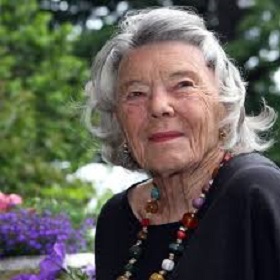
Rosamunde Pilcher (Lelant, 22 september 1924)
Onafhankelijk van geboortedata
De Amerikaanse schrijver Nathan Hill werd geboren in Cedar Rapids, Iowa, in 1976. Zie ook alle tags voor Nathan Hill op dit blog.
Uit: The Nix
“No,” Samuel’s mother said. “We put that picture away.”
“We did? I don’t remember that.”
“It was your decision.”
“It was?” he said, befuddled. He thought he was losing his mind. Years later, in a high-school biology class, Samuel heard a story about a certain kind of African turtle that swam across the ocean to lay its eggs in South America. Scientists could find no reason for the enormous trip. Why did the turtles do it? The leading theory was that they began doing it eons ago, when South America and Africa were still locked together. Back then, only a river might have separated the continents, and the turtles laid their eggs on the river’s far bank. But then the continents began drifting apart, and the river widened by about an inch per year, which would have been invisible to the turtles. So they kept going to the same spot, the far bank of the river, each generation swimming a tiny bit farther than the last one, and after a hundred million years of this, the river had become an ocean, and yet the turtles never noticed.
This, Samuel decided, was the manner of his mother’s departure. This was how she moved away—imperceptibly, slowly, bit by bit. She whittled down her life until the only thing left to remove was herself.
On the day she disappeared, she left the house with a single suitcase.
The headline appears one afternoon on several news websites almost simultaneously: governor packer attacked!
Television picks it up moments later, bumping into programming for a Breaking News Alert as the anchor looks gravely into the camera and says, “We’re hearing from our correspondents in Chicago that Governor Sheldon Packer has been attacked.” And that’s all anyone knows for a while, that he was attacked. And for a few dizzying minutes everyone has the same two questions: Is he dead? And: Is there video?
The first word comes from reporters on the scene, who call in with cell phones and are put on the air live. They say Packer was at the Conrad Hilton Hotel hosting a dinner and speech. Afterward, he was making his way with his entourage through Grant Park, glad-handing, baby-kissing, doing all your typical populist campaign maneuvers, when suddenly from out of the crowd a person or a group of people began to attack.
“What do you mean attack?” the anchor asks. He sits in a studio with shiny black floors and a lighting scheme of red, white, and blue. His face is smooth as cake fondant. Behind him, people at desks seem to be working. He says: “Could you describe the attack?”
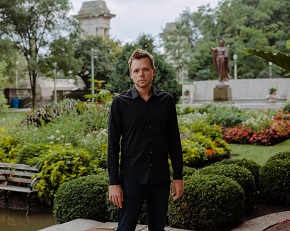
Nathan Hill (Cedar Rapids, 1976)
Zie voor nog meer schrijves van de 22e september ook mijn blog van 22 september 2013 deel 2.
|



